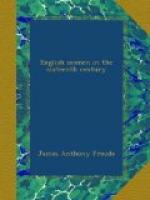account to read the King of Spain a necessary lesson
and pay their expenses at the King of Spain’s
cost. Young Protestant England had taken fire.
The name of Drake set every Protestant heart burning,
and hundreds of gallant gentlemen had pressed in to
join. A grandson of Burghley had come, and Edward
Winter the Admiral’s son, and Francis Knolles
the Queen’s cousin, and Martin Frobisher, and
Christopher Carlile. Philip Sidney had wished
to make one also in the glory; but Philip Sidney was
needed elsewhere. The Queen’s consent had
been won from her at a bold interval in her shifting
moods. The hot fit might pass away, and Burghley
sent Drake a hint to be off before her humour changed.
No word was said. On the morning of the 14th
of September the signal flag was flying from Drake’s
maintop to up anchor and away. Drake, as he admitted
after, ’was not the most assured of her Majesty’s
perseverance to let them go forward.’ Past
Ushant he would be beyond reach of recall. With
light winds and calms they drifted across the Bay.
They fell in with a few Frenchmen homeward-bound from
the Banks, and let them pass uninjured. A large
Spanish ship which they met next day, loaded with
excellent fresh salt fish, was counted lawful prize.
The fish was new and good, and was distributed through
the fleet. Standing leisurely on, they cleared
Finisterre and came up with the Isles of Bayona, at
the mouth of Vigo Harbour. They dropped anchor
there, and ’it was a great matter and a royal
sight to see them.’ The Spanish Governor,
Don Pedro Bemadero, sent off with some astonishment
to know who and what they were. Drake answered
with a question whether England and Spain were at
war, and if not why the English merchants had been
arrested. Don Pedro could but say that he knew
of no war, and for the merchants an order had come
for their release. For reply Drake landed part
of his force on the islands, and Don Pedro, not knowing
what to make of such visitors, found it best to propitiate
them with cartloads of wine and fruit. The weather,
which had been hitherto fine, showed signs of change.
The wind rose, and the sea with it. The anchorage
was exposed, and Drake sent Christopher Carlile, with
one of his ships and a few pinnaces, up the harbour
to look out for better shelter. Their appearance
created a panic in the town. The alarmed inhabitants
took to their boats, carrying off their property and
their Church plate. Carlile, who had a Calvinistic
objection to idolatry, took the liberty of detaining
part of these treasures. From one boat he took
a massive silver cross belonging to the High Church
at Vigo; from another an image of Our Lady, which the
sailors relieved of her clothes and were said, when
she was stripped, to have treated with some indignity.
Carlile’s report being satisfactory, the whole
fleet was brought the next day up the harbour and moored
above the town. The news had by this time spread
into the country. The Governor of Galicia came
down with all the force which he could collect in




